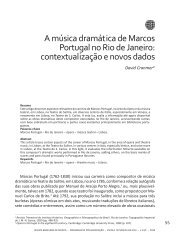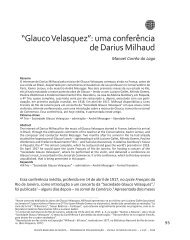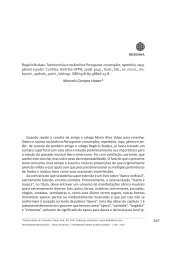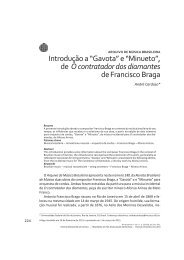Versão Digital - UFRJ
Versão Digital - UFRJ
Versão Digital - UFRJ
You also want an ePaper? Increase the reach of your titles
YUMPU automatically turns print PDFs into web optimized ePapers that Google loves.
20<br />
and abroad. 4 While I would be hesitant to grant as much artistic significance to an Erminia<br />
Frezzolini or a Napoleone Moriani as to a Giuseppe Verdi, to an Isabella Colbran or an<br />
Andrea Nozzari as to a Gioachino Rossini, to a Maria Malibran5 or a Rosine Stolz as to a<br />
Gaetano Donizetti, there can be little doubt that composers worked closely with singers<br />
and sought to make their performing capabilities the measure by which their compositional<br />
art would be judged. It is no surprise that in preparing his Macbeth in 1847, Verdi involved<br />
directly Felice Varesi in the title role and Mariana Barbieri-Nini as Lady, even asking them<br />
to look at their solo music ahead of time and to provide judgments as to whether it suited<br />
properly their vocal proclivities. 6 If not, the composer was prepared to adapt his music to<br />
their capabilities or to modify it as appropriate. Perhaps the composer’s failure to do the<br />
same for Varesi when preparing La traviata was partially responsible for the failure of the<br />
first version of that opera in 1853. 7<br />
By studying the art of individual singers, one can understand better the limits<br />
within which composers were operating. Even though Verdi may have had some doubts<br />
ultimately about the French baritone Victor Maurel, for whom he prepared three roles<br />
(the revised Simon Boccanegra, Iago, and Falstaff), he knew that Maurel’s art was<br />
exceptional. Even when Maurel may have exaggerated (introducing, for example, multiple<br />
reprises of “Quando ero paggio”– the last of which he often sang in his native French), 8<br />
the composer remained relatively loyal to him, knowing that the success of his opera<br />
depended on Maurel’s brilliance. Both Verdi and Muzio may have complained quite bitterly<br />
about Jenny Lind’s “old-fashioned” approach to vocality in the 1847 I masnadieri for London<br />
and Lind herself (as Roberta Marvin has shown9 ) may have had little patience for the new<br />
vocal art he exemplified, still, the composer modified many vocal details in his score so<br />
that it gave Lind a better chance to shine. That was what the public demanded, and he<br />
knew that the public ultimately would determine the fate of any opera.<br />
Among the newer questions being asked today are those that deal with the use<br />
the public around the world made of the musical repertory, especially of opera. 10 While<br />
such questions, which can be grouped generically under the heading of “reception theory,”<br />
...........................................................................<br />
4 Let me cite, in particular, the work of Hilary Poriss, Changing the Score: Arias, Prima Donnas, and the Authority<br />
of Performance (Oxford University Press: New York, 2009), as well as the collection of essays, Roberta Montemorra<br />
Marvin and Prof. Poriss, eds., Fashions and Legacies of Nineteenth-Century Italian Opera (Cambridge University<br />
Press: Cambridge, 2009). There are several articles by Mary Ann Smart which address the problem, including<br />
“The Lost Voice of Rosine Stolz” in Cambridge Opera Journal 6 (1994), 31-50 and “Verdi Sings Erminia Frezzolini”<br />
in Verdi Newsletter 24 (1997), 13-22. See also, Susan Rutherford, The Prima Donna and Opera, 1815-1930<br />
(Cambridge University Press: Cambridge, 2006), and Céline Frigau’s master’s thesis for Paris VIII, 2006 (Une voix,<br />
un geste, un corps : Giuditta Pasta en scène : opinions de spectateurs dans La Pasta nell’Otello, Luigi Morando<br />
de Rizzoni, Vérone, 1830) and her doctoral dissertation of 2010, which deals with performers at the Théâtre-<br />
Italien in Paris during the first half of the nineteenth century.<br />
5 An important series of essays concerning Maria Malibran was recently published, the fruit of research into this<br />
illustrious singer, daughter of the important tenor, Emanuel García: Malibran: Storia e leggenda, canto e belcanto<br />
nel primo Ottocento italiano, Piero Mioli, ed. (Pàtron editore: Bologna, 2010).<br />
6 For further information, see the Preface to the critical edition of Macbeth, David Lawton, ed., in The Works of<br />
Giuseppe Verdi, Series I, vol. 10 (The University of Chicago Press: Chicago, and Casa Ricordi—BMG Ricordi:<br />
Milan, 2006).<br />
7 See the Preface to the critical edition of La traviata, Fabrizio Della Seta, ed., in The Works of Giuseppe Verdi,<br />
Series I, vol. 19 (The University of Chicago Press: Chicago, and Casa Ricordi—BMG Ricordi: Milan, 1996).<br />
8 A recording on Columbia Records, IRCC, N. 4-B (labeled as 1904, but supposedly reflecting a recording sesseion<br />
actually held in London in 1907), demonstrates this: he sings the short aria twice in the original Italian (“Quand’ero<br />
paggio”), then once in his native French (“Quand j’étais page”), accessed on YouTube, 2 June 2011.<br />
9 See the Preface to the critical edition of I masnadieri, Roberta Montemorra Marvin, ed., in The Works of<br />
Giuseppe Verdi, Series I, vol. 11 (The University of Chicago Press: Chicago, and Casa Ricordi—BMG Ricordi:<br />
Milan, 2000).<br />
10 For a particularly astute treatment of the situation in Germany, see Gundula Kreuzer, Verdi and the Germans:<br />
From Unification to the Third Reich (Cambridge University Press: Cambridge, 2010). An important study is about<br />
to be issued by George Martin, entitled Verdi in America: Oberto through Rigoletto (University of Rochester<br />
Press: Rochester, N.Y., forthcoming).<br />
Atualidade da Ópera - Série Simpósio Internacional de Musicologia da <strong>UFRJ</strong>






